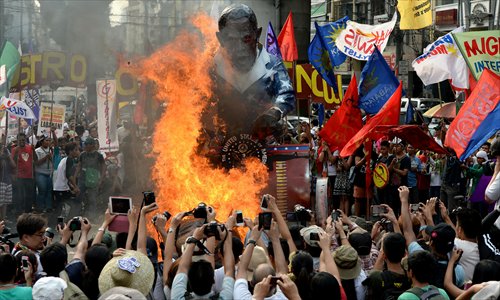Pact not anti-China: Obama

Protesters burn an effigy of US President Barack Obama during an anti-US protest near Malacanang Palace in Manila Monday. Obama landed in the Philippines Monday to cement new defense ties on the last leg of his Asian tour. Photo: AFP
US President Barack Obama said Monday that a newly inked security pact with the Philippines does not aim to counter a rising China.
He made the remarks during the last leg of his Asia tour aimed at reassuring allies of Washington's seriousness in its strategic shift toward the region.
Despite the US leader's efforts to mitigate Beijing's doubts, analysts indicate the defense agreement will in fact narrow the window of conflict settlement in the South China Sea and encourage recklessness by Manila in any potential clash with Beijing.
The Enhanced Defense Cooperation Agreement (EDCA) was signed by US Ambassador to the Philippines Philip Goldberg and Filipino Secretary of National Defense Voltaire Gazmin hours before Obama's arrival in Manila.
The EDCA, which will have an initial 10-year term, will allow for the enhanced rotational presence of US forces at agreed locations in the country, said a press release from the US Embassy to the Philippines in Manila.
It stated that the US will not establish a permanent military presence or base in the territory of the Philippines.
"Our goal is not to counter China. Our goal is not to contain China. Our goal is to make sure that international rules and norms are respected and that includes in the area of maritime dispute," Obama told a joint press conference following talks with Philippine President Benigno Aquino III.
Obama, however, reiterated US support for Manila seeking international arbitration over territorial claims in the South China Sea.
In response to whether Obama's Asia tour and the defense pact are perceived as targeting Beijing, China's foreign ministry spokesperson Qin Gang Monday told a regular press briefing that China will not only listen to Washington's words but also watch its deeds.
Wu Shicun, president of the Haikou-based National Institute for South China Sea Studies, said that after eight rounds of negotiations in the past two years, the signing of the pact is the biggest gain for the US at the end of Obama's Asia visit.
Two US military bases in the Philippines were closed in 1992 when Manila voted to end their lease amid growing anti-US sentiment.
An editorial in The Philippine Star on Monday attributed China's taking control of the Meiji Reef in the South China Sea in 1995 to the closure of US bases, and said Filipinos currently seem ready to accept an increased US military presence in the country.
However, Obama was greeted by protesters in Manila on Monday. Some Filipino analysts also expressed skepticism toward the defense pact.
Bobby Tuazon, director for policy studies at the Manila-based Center for People Empowerment in Governance, said it is "an open secret" that the pact's highlighting of disaster relief and humanitarian assistance is "just a ploy for what are clearly offensive weapons and forces that are designed to enhance US power hegemony in the Asia-Pacific, preventing the rise of other competing powers in the region."
"The increased presence of US forces in the Philippines and war exercises that will be conducted in the South China Sea will militarize the seas and trigger more tension amid the ongoing maritime territorial disputes between Asian countries. Any prospect of peaceful negotiation on these matters will be undermined," Tuazon told the Global Times via e-mail.
Wang Xiaopeng, an expert in maritime and border studies at the Chinese Academy of Social Sciences, warned of wrong signals being sent by the US. This may encourage reckless provocations by Manila against Beijing and spur other claimants to the South China Sea to follow suit.
Wang told the Global Times that the pact is not going to effectively help raise Manila's defense capabilities.
"The country is among the weakest in ASEAN in terms of military strength and 10 years will not help to improve its compatibility," he said.
According to Wu, to the Philippines' disappointment, there still remains a question mark on how much commitment Washington pledges to come to its aid if a military clash ever breaks out between Beijing and Manila.
In comparison to Obama's pledge that the Diaoyu Islands, disputed territory between China and Japan, fall under the US-Japan security treaty, there is no specific commitment by Washington on territorial disputes in the South China Sea.
Wang noted that the US is not obliged to assist Manila in such disputes in accordance with the 1951 Mutual Defense Treaty.
"With respect to some of the difficult territorial issues that are being worked through, it is hard to speculate on those because they involve hypothetical situations in the South China Sea," US Deputy National Security Advisor Ben Rhodes was quoted by AFP as saying.
"The Philippines is just a pawn of the US amid its rebalancing in Asia. Once the US shifts its strategic pivot away, it will be deserted," Wang noted.